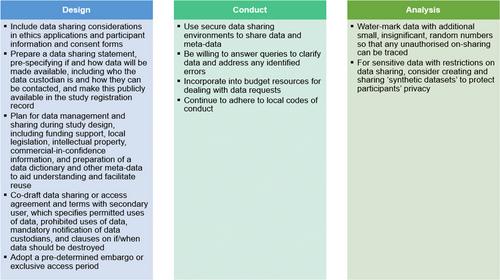Sharing of individual participant data enhances the value of existing data to generate new evidence and inform decision-making. While there is strong in-principle support for data sharing, in practice study data are often difficult to find, access, and re-use. Currently, there is no consensus statement to guide the data-sharing process. In particular, more guidance is needed on the responsibilities of data recipients for re-using individual participant data.
To determine views on the responsibilities of recipients of study data, and to propose how these responsibilities could be met.
A 2-h online focus group was conducted at the 2021 Association for Interdisciplinary Meta-research and Open Science conference. Three example data-sharing scenarios were discussed (evidence synthesis, study reproducibility, and secondary analyses). Notes and audio transcripts were collated using thematic analysis and shared with attendees for further iterative input.
A purposive sample of 16 conference delegates attended the focus group. Analyses revealed four recurring themes that were synthesized into recommendations. The “privacy and ethics” theme described the need for data recipients to prioritize the protection of participant privacy, and the recommendation to proactively share a secure data management plan and evidence of ethical oversight with the data provider. The “capability and resourcing” theme required recipients to demonstrate sufficient capacity to process and analyze study data. The “recognition and collaboration” theme asserted the responsibility to acknowledge the contributions of data providers and invite them to contribute to the secondary project. Last, the “compliance” theme focused on the responsibility to adhere to local data sharing regulations.
Successful data sharing and re-use requires cooperation from multiple stakeholders. We identified the responsibilities of recipients of study data to the individual from whom data arose and the research team who collected the data. Implementation of these in practice could facilitate increased data sharing.


